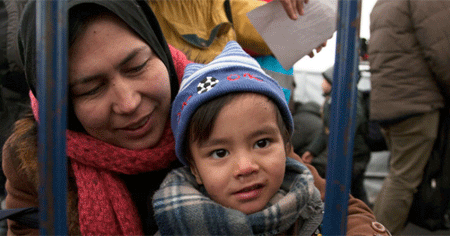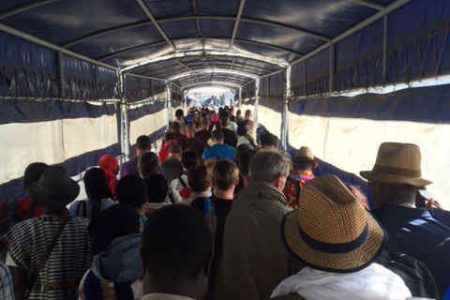At the end of the year 2016 there were elections in Ghana and Gambia. The Ghanaians have again managed to elect the fifth new president for the sixth consecutive democratic elections successfully held after the introduction of their new constitutional governance in 1992 in the person of Nana Akufo-Addo, who assumed Office free of any scandals. Unfortunately, this wasn’t the case in the Gambia. President Adama Barrow was denied his electoral victory by the incumbent Yayah Jammeh, who had held on to power for 22 years. Meanwhile, in the DR Congo elections should have taken place but President Kabila sought to amend the constitution to allow him remain in office. Although his plan failed due to the massive protests of the opposition parties and the general population, the elections still did not take place. The ruling classes barely observe the laws of their own countries, but certainly expect the population to do so.
In Cameroon, an uprising in the English-speaking part of the country has been going on for some time now. A federation of the two official languages, English and French, is anchored in Cameroon’s constitution. But for years the central French-speaking government has oppressed the English-speaking population, marginalising them politically and economically. Despite the peaceful nature of the current protests President Paul Biya, who has been in power since 1982, reacted with brutality that left several people dead. European politicians are yet to comment and German media have hardly reported it. Years of co-operation between Western governments and African dictators have been to the detriment of the continent’s populations and have undermined civil society’s efforts to implement “good governance” and human rights. Cameroun isn’t alone, Togo, Gabon and several other French-speaking countries on the continent have had their fair share of this experience.
As the exploitation of Africa by the West in cooperation with the African elites continues apace, we must not forget that by 2050 the population of Africa will grow to as much as 2.4 billion people. Without a different economic policy designed to create jobs and prospects for local populations where they live, migratory pressure on Europe will continue to increase. Instead of erecting high barbed wire fences, the EU would have to stop exploitations and unfair trade with the African continent now. The current actions of EU politicians may minimise the problems, but do nothing to solve them. The agreements reached with Niger, Mali and other countries to keep the refugees away are typical of Europe. However, not every problem can be solved with money.
How forgetful are the Europeans: Just a few decades ago, when conditions on the European continent were poor, an estimated 60 million people emigrated to every corner of the world. But today, populists and nationalists in many European countries vehemently disseminate hostility and negative attitudes towards refugees and migrants.
The press is also partly responsible for the widespread negative perception of migration in Europe. That some segment of the European population feels the press is “untrustworthy” should be a significant cause for concern. Of course, these topics are very complex, but it is the responsibility of the press to provide understandable background information on important topics. Very often, the role of Western corporations in the political events that are of the causes of flight are not discussed. The people of Europe have a right to this information. However, if people feel that the press is just an extension of the government and big business, credibility issues arise. While the press reports exhaustively on the Russian bombing campaigns in the Syrian war, where are the reports on the current activities of the US and its allies? One can hardly find any information. Have they withdrawn? Who is delivering weapons to whom? These questions are rarely addressed in detail. But there are many articles warning of “refugees” as a threat to social peace in Europe. Has this kind of coverage increased nationalism and populism in Europe?
How does the African press report about migration and refugees? In cooperation with the Erich Brost Institute for International at the Technical University of Dortmund and the African Media Institute in Kenya, Africa Positive e.V. organised a conference with journalists and media from several countries. One conclusion was that migration is perceived positively in many African societies. However, the role of the smugglers in the refugee crisis was quite controversial with such comments as “Are smugglers just travel agents for travellers without valid papers?” and “Can it be so bad if they offer a sought-after service?”
Europeans should consider new regulations to facilitate legal entry to the continent, which would reduce illegal migration. While today we often speak of the inequitable distribution of wealth, we must also recognise injustice when the freedom to travel is granted to the citizens of a few nations of the West while being denied to countless individuals from Africa and other continents.
[:]



